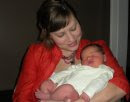
We Are Shaped by the Past by Joan Chittister
The past colors the way we look at today and think about tomorrow. It forms our very definition of ourselves.
The past never, ever really leaves any of us. All of us come from something — an alcoholic home, incest, embarrassing poverty, perhaps. That’s why it is so important, both to our spiritual life and to our psychological well-being, that we come to be able to sing our alleluias about it.
The past stores up inside us a veritable gallery of models from which we draw life patterns yet. I remember from my own past the woman down the hall with diabetes who lay in her bed day after day, legs long gone, but smiling as she crocheted blankets for the
rest of the family. She stays in my heart, reminder of the fact that it is possible to suffer the worst and never sour under it.
I remember the deaf young man down the street who taught me sign language because he had no one to talk to, and whose sign language alphabet card I keep in my Bible yet to remind me that no one comes into your life unless you reach out to them.
I remember the gruff old man who sat on a stool in the alley swearing at children as they walked wide circles around him and from whom they all learned to swear back.
They walk with me, these ghosts from the past, smiling at me, signing to me, warning me that it is possible to isolate myself in a small, mean world and to take others with me there if I want to live a world unto myself.
Indeed, the past is a storehouse of the memories that have formed us and shaped us and prepared us for worlds far beyond the one in which we grew.
But the past is even more than its treasury of the yesterdays that marked us with their sadness and deprivations and struggles and lingering flashes of the first meanings of love. The past is all we know of the possibilities we each harbor within us. The past burns into our flesh, like a flaming brand, the awareness that what we have survived before, bested before, done before, we can do again.
The best proof we have against destruction and despair is our memories of having wrestled with life before now — and prevailed. These are what sustain the young woman, a long-ago incest victim, who begins to recognize as part of her healing that, whatever the trauma she’s been through, she is, after all, a survivor. These are what go with the man who withstood taunts about his thick glasses from the other children in school to become the class valedictorian years later, who knows that he has been freed of any allegiance to the emotional control of others. These are the mainstay of the young widow who was raised by her widowed mother and knows that she can do it, too, and that her children will be no worse developed by the specter of the broken family because she herself is not.
Why bother to remember the past? Because the past is the one proof we have that the present is possible.
In the final analysis, then, the past is an alleluia for graces then unknown and now full of meaning. “Even though you intended to do harm to me,” Joseph says to the brothers who, out of rivalry for their father’s love, sold him into slavery in Egypt, “God intended it for good, in order to
Every moment of life is an alleluia moment for the past. One of the major graces of life is to come to realize that.
– from Uncommon Gratitude: Alleluia for All That Is by Joan Chittister and Archbishop Rowan Williams (Liturgical Press)






